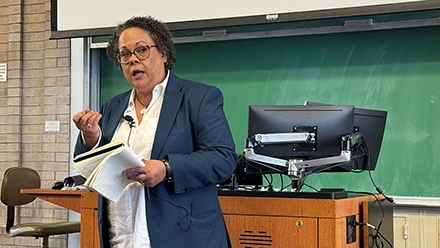Cody Keenan Shares Lessons from Professional Journey to Obama White House
President Barack Obama’s second chief speechwriter, Keenan stressed to students the value of being open-minded and eager.
Professionally, Julie Lythcott-Haims has not taken a linear path. She’s been a corporate attorney, a dean at Stanford University, a best-selling author, and an elected member of the Palo Alto, California, city council.

“It doesn’t matter what other people think of my type of person, what I look like, my ancestry,” Lythcott-Haims said. “I know I’m worthy of love. I am filled with self-love. My definition of success has become ‘what do I want from this life, not what do I need to do to meet with their approval?’”
Eventually, Lythcott-Haims learned that lesson about their kids.
Originally hoping to fight for social justice, Lythcott-Haims jumped from working in corporate law in Silicon Valley to Stanford, where she served as dean of law students and then first-year students. She would ask young adults – studying at one of the world’s most prestigious universities – what they would do with their lives if it was up to them? She glowed when the students answered they would find a balance and pursue their passions.
It was harder to feel that way when it came to their own children, as she recalled during her April 11 talk “A Day with Julie Lythcott-Haims: I Designed My Life – Now It's Your Turn!” Sponsored by Northwestern Engineering’s Personal Development StudioLab, this lecture was part of the StudioLab’s Curious Life Seminar Series.
Despite witnessing helicopter parents at Stanford and wanting to avoid becoming one, Lythcott-Haims admittedly fell into the same traps with their son and daughter. When their daughter was four years old, she showed talent in art. Outwardly, she was happy about this, but inside she fretted it wouldn’t help their daughter get into college.
Meanwhile, Lythcott-Haims’s son expressed an interest in biology, wanting a PhD and maybe even a Nobel Prize. But their son suffered from anxiety and ADHD, which “battered” him at a small college.
She could see other people’s children struggling, but not their own.
“I have been on a journey to re-pattern my way of thinking around my kids, coming to terms with all of these contradictions,” Lythcott-Haims said. “Why can I root for all the other humans on the planet to be themselves, except my own two kids?”
This led Lythcott-Haims to go on a journey of introspection and wondering. Now, she speaks proudly about their daughter, a thriving visual and performing artist, regretting that she couldn’t cherish and accept their daughter’s path from the start. Lythcott-Haims’s son works as an aid for children with special needs at a local school.
She recalled the experience of witnessing their son's students approach him outside of school. Sometimes, kids will even ask Lythcott-Haims if she is their teacher’s mom.
Fighting back tears, Lythcott-Haims's pride has was clear.
“Neither of my kids are doing what I remotely hoped, and I’ve never been prouder of them,” she said. “I’m also proud of myself for trying to do the work to continue to learn to be curious about my own limitations so I can grow up to be the parent my kids deserve.”
President Barack Obama’s second chief speechwriter, Keenan stressed to students the value of being open-minded and eager.
Former Google vice president Karen May made that connection, imploring students to pursue their true passions.
Trieschmann detailed her life and career, sharing how a mistake eventually impacted so many people.
Cooper spoke at a flash forum talk to celebrate the launch of the Personal Development StudioLab.
Codirected by Joseph Holtgreive, assistant dean for undergraduate engineering, and Bruce Ankenman, professor of industrial engineering and management sciences, the Personal Development StudioLab is a space where students develop and practice their life approach, as they hone their craft and connect with themselves and others, to create a better future.
The StudioLab supports the McCormick School of Engineering and Northwestern University by providing students with courses, opportunities, resources, and events that increase awareness, understanding, and healthy responses to their physical, emotional, and cognitive experiences.
Through this environment, the StudioLab helps transform students into mindful, curious, whole-brain thinkers who integrate all elements of their being to best clarify, frame, and address the important and complex problems of life in a meaningful and fulfilling way.